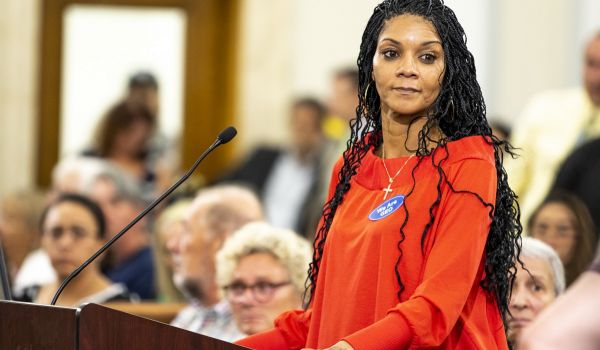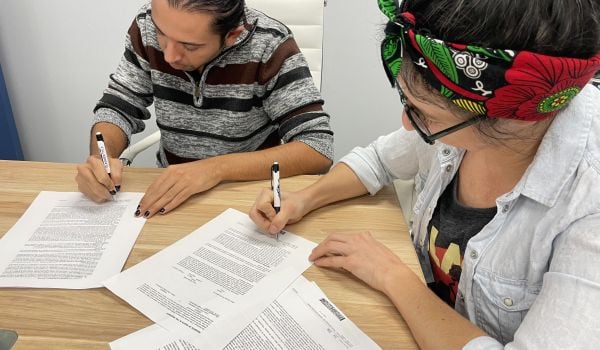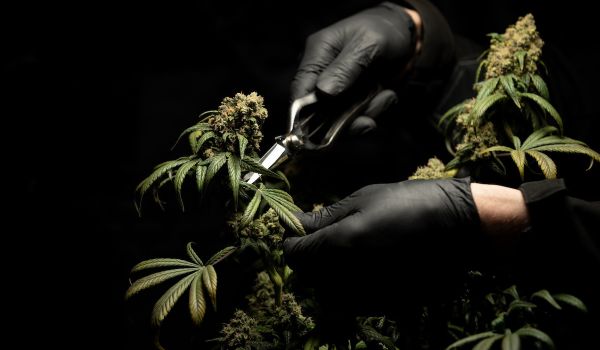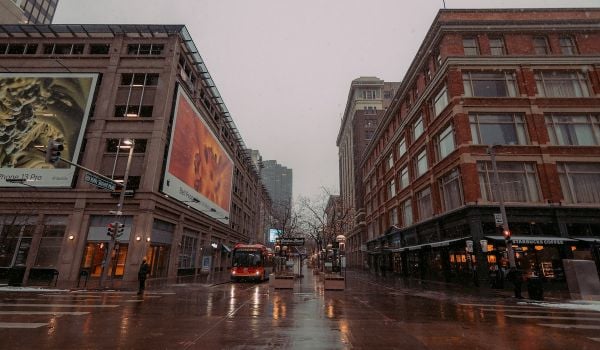In 2016, Denver resident Sarah Woodson decided she was going full force into Colorado state’s emerging legal cannabis economy. She founded the smoke-and-paint class Kush and Canvases. She worked as a consultant for the Marijuana Industry Group, learning how cannabis laws were being made and the influence of lobbyists. Through all of it, two things became painfully clear: There were no industry voices that represented Black and Brown communities, and it was exceedingly difficult for people of color to break into the industry.
In 2019, she founded the Color of Cannabis to push for more equitable representation and ownership in Colorado’s cannabis industry. Now, one of her most successful initiatives, a 10-week social equity business registration class, was just funded by Denver’s city’s retail marijuana special sales tax revenues, which will turn the course into an official city offering to train and support Denver residents of color who want to break into the business.
“The funding puts this organization in a position of power to lead people in the right direction,” Woodson says. She adds that “we are playing the long game” with the goal of more radically overhauling the state’s cannabis industry to make it truly equitable.
Recreational marijuana was legalized in Colorado in 2012. Woodson says the state made two crucial errors that kept the industry predominantly white: It did not pardon cannabis crimes or expunge anyone’s record of them post-legalization, alongside a legal stipulation that barred anyone with a felony from entering the industry for 10 years.
On top of that, the industry is highly complex, with legal considerations, steep taxation, strict regulations and high barriers to entry. “Regulatory challenges have left some people in the game and some people out of the game,” Woodson explains. “The harder the regulation, the more money you have to have to participate.”
As Woodson consulted and advocated for a more equitable industry, she poured her learnings into a curriculum that launched under the Color of Cannabis in 2020. “The way I built the course was from the perspective of someone who’s trying to get into the industry and all of the things that I needed to learn,” she says. “I knew people didn’t understand zoning — they needed to know that and hear from regulators. I knew people didn’t know what stakeholder meetings are, or 280E.” (That’s the federal tax code that penalizes cannabis business owners.)
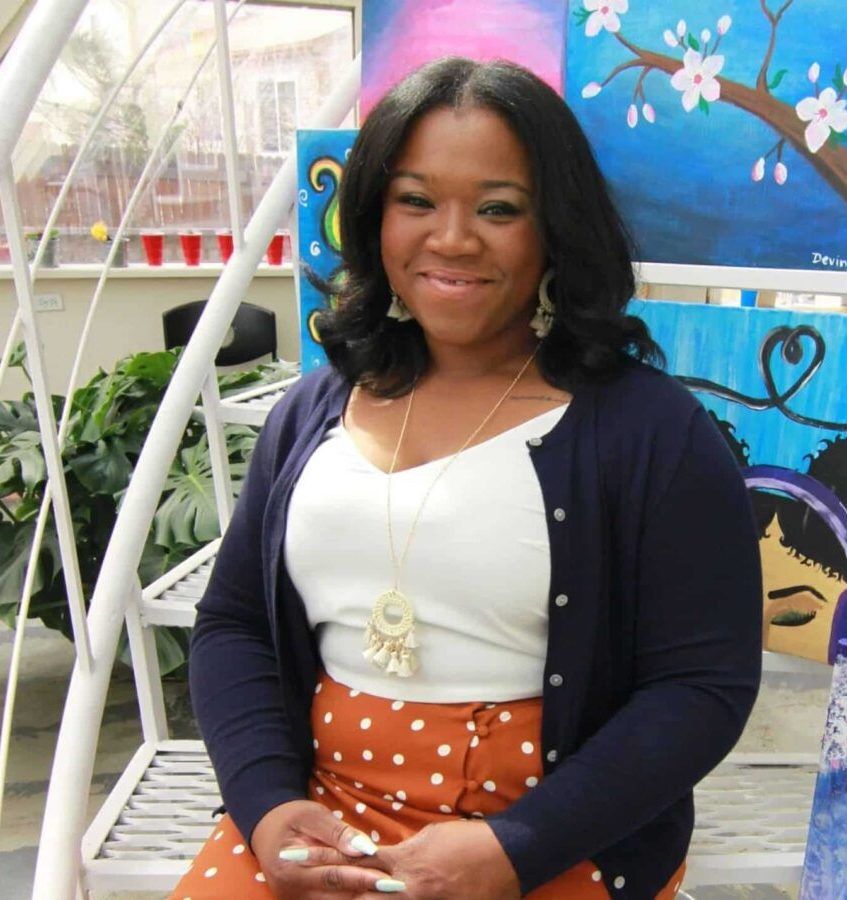
Sarah Woodson founded the Color of Cannabis in 2019. (Photo courtesy Woodson)
As she met people in the industry, she asked them to serve as guest speakers for the course. “I asked them for donated time,” she says. “It wasn’t too difficult to find people, and the ones I couldn’t find eventually showed up.” Most challenging was finding speakers on marijuana cultivation — many companies are secretive about their growing processes — as well as delivery, an emerging opportunity in the city. Smokey’s Cannabis Co and the Lantern delivery service filled those gaps.
Other topics the course covers include “the policy of pot,” how the industry is regulated, best practices in cannabis marketing, zoning and real estate, securing funding, navigating legal issues and banking.
As the curriculum continued and Woodson increased her advocacy, last year Denver Mayor Michael Hancock signed into law a set of bills designed to create a comprehensive social equity program for marijuana licensing in the city. The legislation designated “social equity applicants” who have lived in disinvested neighborhoods, are low-income, or have been impacted by marajuana convictions. The laws aim to increase licensing opportunities and reduce barriers to entry. It also finally introduced a free program to have certain low-level marijuana conviction records sealed.
Technical assistance was another part of the bill. “If we’re going to make these licensing opportunities available, it has to be more than just providing access to these licenses,” says Deborah Cameron of Denver’s Office of Economic Development. “We need to set the social equity applicants up for success. We would not be doing them a service if we gave them a license and didn’t help them to be successful in the business.”
The city released a request for proposals for a technical assistance program earlier this year and announced the Color of Cannabis as its partner this June. “Sarah is already a trusted voice in the community,” Cameron says, “As a city we didn’t want to recreate the wheel — there was already a partially-designed, operating wheel in place, and we could use our resources to really amplify the work already going on.”
The curriculum’s fifth cohort — and the first with city support — is kicking off this month. The city will track metrics like the number of social equity applicant businesses who complete the 10-week curriculum, become licensed, raise capital, create jobs and continue to operate with social equity ownership.
Even with technical assistance in place, that path is an uphill battle. Shanda LeCompte, owner of Canna Couriers, participated in the Color of Cannabis’ course and got licensed a little over a year ago. The company is still not operating, LeCompte told ABC Denver recently. She believes that financial support for minority business owners should be more significant, given the $2.2 billion in state cannabis sales last year.
“We have broken through the educational challenge, but there are so many different kinds of challenges,” Woodson says. She points to a delivery license initiative in Denver: The social equity program mandates that delivery licenses must involve social equity business owners, but the program hasn’t worked out so far.
“It’s very expensive to run a delivery company and the regulatory framework makes it difficult,” Woodson notes. Beyond financial support, Woodson believes in deeper, more systemic industry changes and a more intentional centering of marginalized voices. “The people who go through our cohorts — they aren’t in the room to create or provide feedback on these regulatory frameworks and rules.”
Woodson hopes the people who graduate from each cohort will translate to more advocacy and political pressure around cannabis equity: “I want them to understand that if you don’t participate in the political process, you won’t be able to move your stake forward in the industry.”
This article is part of The Bottom Line, a series exploring scalable solutions for problems related to affordability, inclusive economic growth and access to capital. Click here to subscribe to our Bottom Line newsletter.

Emily Nonko is a social justice and solutions-oriented reporter based in Brooklyn, New York. She covers a range of topics for Next City, including arts and culture, housing, movement building and transit.
Follow Emily .(JavaScript must be enabled to view this email address)




